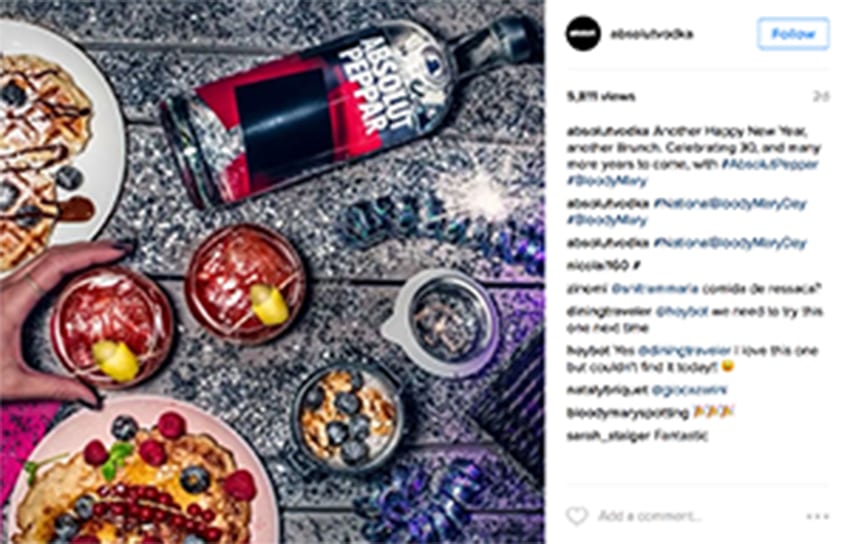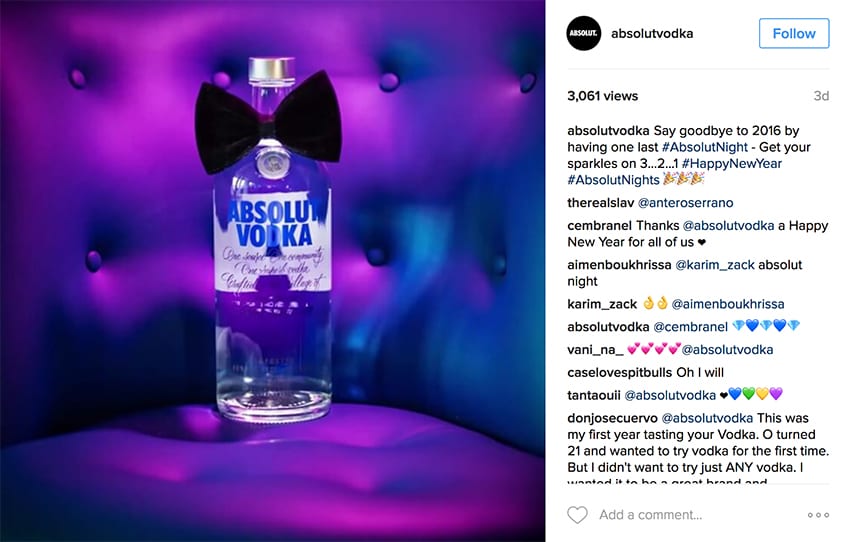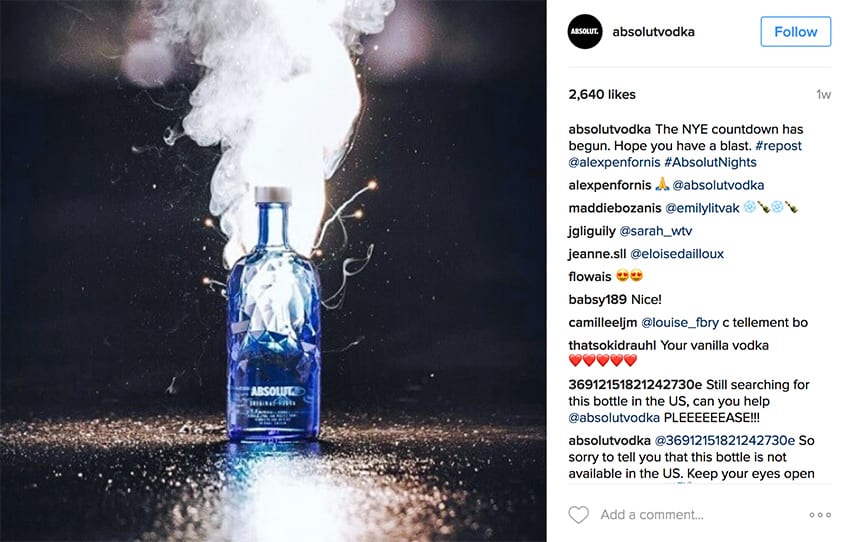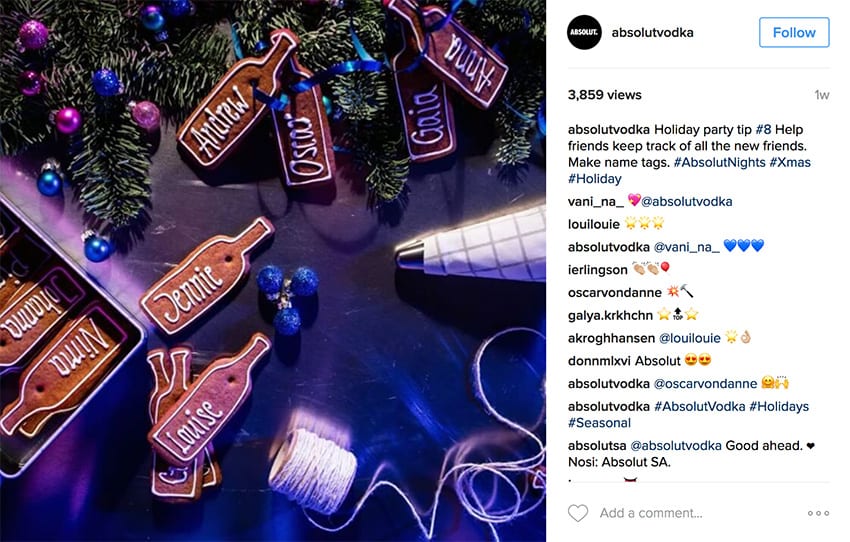The new year is barely four days young. I hope you have all had wonderful holidays and a great start to 2017. Happy New Year everyone!
As 2017 commences, the movement to spend January “dry” is growing worldwide. For example, bars in New York City have started catering to the demand for alcohol-free drinks and more and more people participate in different campaigns to start the new year free from alcohol.
That’s great news on so many levels. It’s good for the individual person, their families and workplaces. It’s good for society and public health and much more. But it’s bad news for Big Alcohol.
And so they are aggressively working to retain consumers and recruit new ones. To the latter end, Big Alcohol is using social media to target millennials and even younger demographics.
The example of Absolut Vodka’s activities on Instagram exposes, however, the pitfalls of the aggressive marketing push: the marketing tends to contradict and invalidate other messages.
Encouraging consumption, consumption, consumption
Absolut Vodka is the fifth largest international spirit brand in the world, and the number one vodka, according to Pernod-Ricard. But Absolut Vodka has been struggling in recent years, and sales declined by 4% in the first eight months of 2016.
Hence, the zealous marketing.
- New Year’s morning and alcohol use
- New Year’s Eve and alcohol use
- New Year’s Eve and alcohol use
- Holidays and alcohol use
- Christmas and alcohol use
The message emanating from Absolut’s marketing is clear: consume, consume, consume alcohol on every occasion possible. It’s an intoxicating culture.
Marketing message contradicts social responsibility message
The alcohol industry systematically violates its own rules of conduct and self-regulation codes. Obviously, these codes, merely serve as marketing tools superficially portraying an image of responsibility.
But the case of Absolut Vodka and their Instagram posts shows what matters to Big Alcohol: marketing driven sales, brand promotion – not social responsibility.
Pernod-Ricard, Absolut’s parent company, is contradicting itself. These Instagram posts expose the hypocrisy of their 2015 “Code for Commercial Communications”.
Article one stipulates:
Commercial Communications should not encourage or condone excessive or irresponsible consumption, nor present abstinence or moderation in any negative way.”
Spending the holidays, Christmas eve or New Year’s eve alcohol-free is completely excluded from Pernod-Ricard’s world view, obviously. Moreover, consumers are encouraged to consume alcohol constantly. Much more is wrong about this code, only it has to be discussed in other forums. But the fact that Absolut doesn’t even apply Art. 1.5 – the pledge to add a “responsible drinking message” to all digital marketing – is telling.
Marketing message discredits Big Alcohol lobby vehicles
The European lobby vehicle of the liquor industry, SpiritsEurope, is immediately discredited, too. SpiritsEurope had created a portal in 2015 to inform about the “dangers of alcohol misuse”. Front and center of that portal under the theme “moderation by the numbers” is the message:
Do not drink every day.”
Pernod-Ricard is a member of SpiritsEurope.
The world’s second largest wine and liquor producer is also a member of the International Alliance for Responsible Drinking, IARD. The IARD is the global lobby vehicle of the alcohol industry, directly financed by the twelve biggest alcohol companies. It’s the result of a merger between the International Center for Alcohol Policy (ICAP) and the Global Alcohol Producers Group (GAPG).
Absolut’s marketing message in Instagram also contradicts fundamental principles that IARD claims to promote. One of their guiding principles is supposed to be avoiding of “condoning or trivializing excessive or irresponsible consumption…” Another principle is supposed to be “avoid portraying abstinence or moderate consumption in a negative way.”
While none of the posts does either of these on their own, seen in context and in their entirety the message is clear: abstinence is not even an option. Everything is alcoholized. And permanent alcohol use is glamorized and promoted as the norm.
Therefore, neither SpiritsEurope nor the IARD has any credibility or legitimacy in their missions, as the companies financing them keep exposing the truth about the proclaimed commitment to social responsibility: it’s a hoax.
Big Alcohol has already disqualified itself
The case of Absolut’s marketing on Instagram really illustrates the point of the following analysis:
The characteristic of global alcohol brands is that they are marketing-driven. The product becomes a symbolic object to which the marketers attach a broad range of symbols.
What is being marketed is not as much as product as a lifestyle…,” writes Bakke in a chapter on “Alcohol: Health risk and development issue” in the book “Health Capital and Sustainable Socioeconomic Development”.
What matters is not the single message, but the entirety of the commercial communication as Big Alcohol increasingly attempts to shape our values, norms, and expectations. But that reality is left unmentioned and unaddressed by the political arms of the alcohol industry.
It is in this context, that the alcohol industry has thus already managed to discredit its own attempts to appear socially reposnsbile; consequently, they have disqualified themselves from participating in conversations about preventing and reducing alcohol-related harm. They are simply not credible and serious partners.




